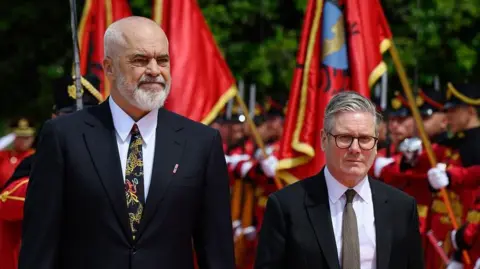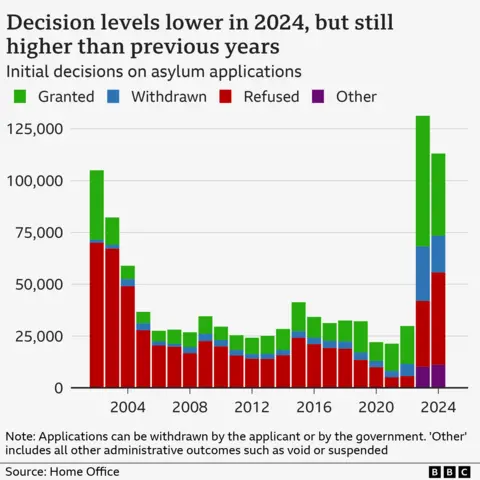UK in talks to send failed asylum seekers abroad
 PA
PAThe UK is in talks with other countries to set up overseas "return hubs" for failed asylum seekers, Sir Keir Starmer has said on his first official visit to Albania.
The prime minister said the government had begun discussions about sending asylum seekers abroad for processing after their claims had been rejected in the UK.
He would not comment on which countries were involved, or where failed asylum seekers could be sent, but Albania said it was not part of the talks.
Sir Keir has travelled to Albania to announce separate measures to crack down on organised crime and illegal immigration.
The number of people crossing the Channel has passed 12,000 since January, putting 2025 on course to be a record year.
"We are in talks with a number of countries about return hubs," Sir Keir said at a news conference in Albania, alongside the country's Prime Minister Edi Rama.
"I see them as a really important innovation."
The BBC has previously reported that the proposals are focused on countries in the western Balkans – a region which includes Albania, Serbia and Bosnia and Herzegovina.
The proposals would apply only to asylum seekers whose claims had been rejected and who had no further routes of appeal in the UK.
It differs from the previous Conservative government's Rwanda scheme, which was scrapped by Sir Keir and involved sending migrants to have their asylum claims processed in the African country.
Italy has a similar scheme, which involves sending failed asylum seekers to Albania while they await deportation, but that plan has been held up by legal action.
Speaking at the news conference, Rama said the scheme was "a one-off with Italy because of our very special relationship".
Rama said the Albanian government had been asked by several countries if it was open to establishing similar schemes.
"We said no because we are loyal to our marriage with Italy," Rama said.
Sir Keir said the return hubs "were consistent with the work" the UK had done with Albania on reducing the number of migrants crossing the English Channel.
Conservative shadow home secretary Chris Philp said Rama's apparent rejection of talks about return hubs had turned the PM's trip into "an embarrassment".
Philp said: "Starmer jetted off and now the Albanian prime minister has made clear that there will be no UK return hubs in Albania.
"So, what was the point of this entire visit?"

The government said there has been a 95% reduction in Albanian small boat arrivals in the past three years, and that the number of Albanians returned has doubled in the past two years.
Immigration has been a strong focus of the government this week.
On Monday, the government set out plans to reduce the level of legal migration in a White Paper.
Sir Keir argued the proposals would bring the immigration system "back into control" and denied it was a response to the success of Reform UK in recent local elections.
The party led by Nigel Farage is promising to freeze non-essential immigration an take small boats in the Channel back to France.
In Albania, the prime minister announced further co-operation with Albania on tackling illegal migration and organised crime.
Sir Keir said: "The last government lost control of the borders. I am determined that we will retake control of the borders.
"That means that we have got to have a concerted effort to smash the gangs that are running this vile trade."
He said greater co-operation with Albania had "driven down those numbers" and that he wanted to "see more of that".
The prime minister announced the expansion of the Joint Migration Task Force - which shares intelligence and carries out operations against people smugglers in the Western Balkans - to include North Macedonia.
The enhanced co-operation with Albania will include measures to tackle a "revolving door effect", of migrants returning home, evading law enforcement and leaving the country again, the government said.
The plans also includes:
- A new programme to help young Albanians reintegrate into society and find employment
- Funding a new forensic evidence programme to share and track DNA of criminals in Albania to solve crimes in the UK
- A further £1m investment to upgrade Albania's forensics, biometrics and digital capability
- Greater intelligence sharing to allow local law, using UK-funded drones, to "snare gangsters" transporting migrants through the Western Balkans corridor
